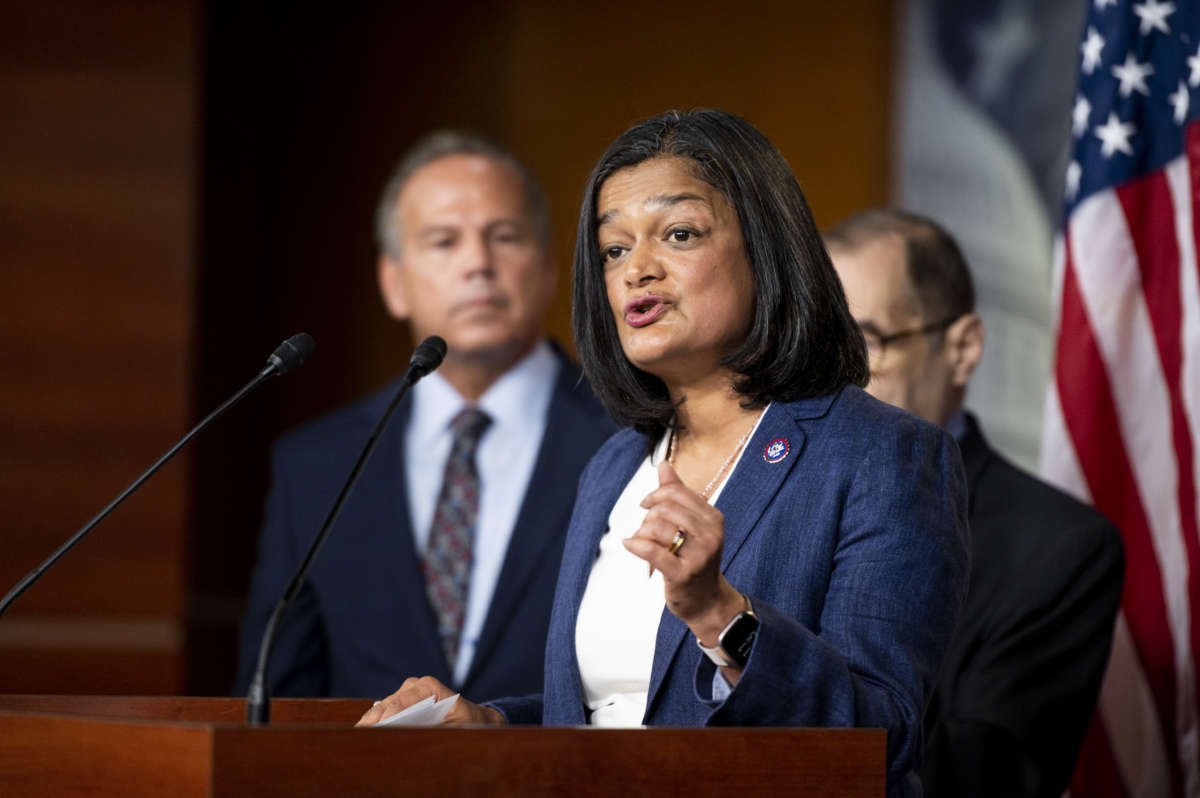Honest, paywall-free news is rare. Please support our boldly independent journalism with a donation of any size.
As the United States Senate on Saturday voted to advance a $1.2 trillion bipartisan infrastructure package, progressive lawmakers warned that they will not vote for the proposed legislation if it does not adequately fund human needs such as healthcare, housing, and climate action.
Saturday’s 67-27 Senate cloture vote on the 2,700-page Infrastructure Investment and Jobs Act (pdf) overcame a major barrier to the measure’s passage, although it was unclear when the Senate would hold a final vote on the bill.
“We can get this done the easy way or the hard way,” Senate Majority Leader Chuck Schumer (D-N.Y.) said on the Senate floor before the vote. “In either case, the Senate will stay in session until we finish our work. It’s up to my Republican colleagues how long it takes.”
The deal — which falls short of the $2.25 trillion originally proposed in President Joe Biden’s American Jobs Plan, and is far less than the $10 trillion that progressives say should be spent — includes $550 billion in new infrastructure funding, including for roads and bridges, public transport, railways, broadband internet, port and airport upgrades, power and water system improvements, and environmental remediation.
Notably absent from the deal are progressive agenda items including a 7% corporate tax hike, Medicaid expansion, workforce development, and, critically, measures to address the climate crisis.
Biden took to Twitter Saturday to tout the deal:
We can’t just build back to the way things were before COVID-19, we have to build back better. The Bipartisan Infrastructure Deal and my Build Back Better plan will grow our economy, and create an average of 2 million good-paying jobs every year over the next decade.
— President Biden (@POTUS) August 7, 2021
The Bipartisan Infrastructure Deal is a historic, once-in-a-generation investment in our nation’s infrastructure. It will create good-paying, union jobs repairing our roads and bridges, replacing lead pipes, and building energy transmission lines.
We can’t afford not to do it.
— President Biden (@POTUS) August 7, 2021
Addressing the bill’s climate shortcomings, Sen. Sheldon Whitehouse tweeted Saturday that “the plan is to get this bill passed and focus on the reconciliation package next. That’s where the big climate provisions will be.”
Democrats plan to use the reconciliation process to thwart a Republican filibuster of $3.5 trillion in additional spending on progressive priorities including climate action, Medicare expansion, free community college, universal pre-K, and paid family leave, to be funded by tax hikes on corporations and the wealthy.
Senate Budget Committee Chair Bernie Sanders (I-Vt.) last month called the more ambitious progressive proposal “the most significant piece of legislation… since the Great Depression.”
Progressive lawmakers and advocates have lamented what they say are the bipartisan deal’s many inadequacies, with the Congressional Progressive Caucus vowing Saturday to oppose any bill that does not include funding for climate and social agenda items.
Since this infrastructure process began, we've been fighting for it to include 5 things:
✔️Affordable housing
✔️Care economy
✔️Medicare expansion
✔️Climate action
✔️CitizenshipWe're not backing down now. If the bill doesn't fund these sufficiently, it's not getting our votes.
— Progressive Caucus (@USProgressives) August 7, 2021
As Rep. Pramila Jayapal (D-Wash.) said earlier this week, “If the bipartisan bill isn’t passed with a reconciliation package that has our popular priorities, we’re not voting for it.”
Appearing on Democracy Now! earlier this week, Jacobin staff writer Branko Marcetic said that “the bipartisan bill, by virtue of having to negotiate with the Republicans, who, of course, are climate deniers and… are captured by corporate interests, including fossil fuels, of course, they do not want a whole host of climate measures in there that are going to compete with those industries or that will… eventually phase them out.”
“So, a lot of that stuff has been stripped down,” Marcetic added. “The clean energy standard, which was meant to be one of the cornerstones of transitioning the United States’ electricity grid away from fossil fuels and to renewable energy, that’s out of the bill.”
As The Intercept reported earlier this week, the bipartisan deal includes $25 billion in potential new fossil fuel subsidies.
According to the outlet:
The bill includes billions of dollars for carbon capture, utilization, and storage; hydrogen fuel made from natural gas; and “low emissions buses” that could run on fuels including hydrogen and natural gas. It also encourages subsidies that go unquantified in the legislation, for example urging states to waive property taxes for pipelines to transport captured carbon.
Progressives are also seething at a Republican amendment that would increase Pentagon funding by $50 billion.
Demand that no Pentagon $ be included in the infrastructure bill!! https://t.co/hcoRRW79o1
— Medea Benjamin (@medeabenjamin) August 7, 2021
Marcetic warned of the potential consequences facing Democrats ahead of the 2022 midterm elections if they do not fight for the provisions in the more ambitious $3.5 trillion proposal.
“It’s going to be very difficult for Democrats to actually hold the House and the Senate,” he told Democracy Now!. “If this doesn’t get passed, it will be looked at as a massive missed opportunity that we will really regret, I think, in years to come.”
Trump is silencing political dissent. We appeal for your support.
Progressive nonprofits are the latest target caught in Trump’s crosshairs. With the aim of eliminating political opposition, Trump and his sycophants are working to curb government funding, constrain private foundations, and even cut tax-exempt status from organizations he dislikes.
We’re concerned, because Truthout is not immune to such bad-faith attacks.
We can only resist Trump’s attacks by cultivating a strong base of support. The right-wing mediasphere is funded comfortably by billionaire owners and venture capitalist philanthropists. At Truthout, we have you.
Truthout has launched a fundraiser to raise $34,000 in the next 5 days. Please take a meaningful action in the fight against authoritarianism: make a one-time or monthly donation to Truthout. If you have the means, please dig deep.
